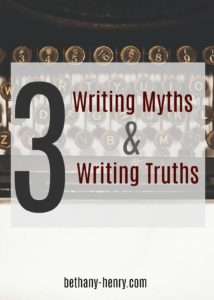Being a writer is a strange and confusing identity.
Sometimes writing is a hobby, sometimes it’s a lifestyle, and sometimes it’s something that sucks up all of our time and makes us frustrated. There are some days we love it and there are days we wonder why we ever started.
Being a writer is sometimes described as a mysterious calling that is too complex to understand. But how can we be writers if we don’t even understand what being a writer means?
Today we’re going to dig deeper into some writing myths and take a look at the truth of what it really means to be a writer.

Writing Myth 1: Writers Are Inspired By A Mysterious Muse
Ever hear about a writer who wrote an entire bestselling book in a weekend because they “felt inspired?” Ever hear of writers waiting for “the muse to strike” or waiting until “the creative juices are flowing” in order to write?
There’s a romanticized notion that writers will be driven to create by impulses that are beyond their control. That the writers are the passive workers simply giving voice to the novel inside of them wanting to be told.
This is the idea of the muse at work.
This is an appealing idea for two reasons.
For one thing, it makes for a dramatic image: The ink stained fingers of the writer flashing as he frantically churns out page after page before slumping on top of his completed manuscript. The scribbling eccentric who ignores the world around her because her story must be told and she has no time for trivialities such as shower or food.
The second reason this idea of being inspired to write is appealing is that it lets us writers off the hook when we don’t feel like writing. After all, who can control inspiration? Relying on a muse keeps us from being responsible.
Unfortunately, writing isn’t always fun or exciting. While there are times when we can each be inspired to create, this inspiration itself is not generally going to carry a project to completion.
Writing Truth 1: Writing is Mostly Work
It would be nice if we could be struck by inspiration and create famous works of art immediately. We are such an instant gratification culture, after all! Having a novel spill from our pen in a fit of creativity sounds ideal.
And sometimes we do feel inspired! There are times we feel incredibly creative and hopefully during these times we can make great progress with our work.
However, inspiration only takes us so far (and sometimes not very far at all). The rest of writing is work, work, and then more work.
It is dangerous to base our work ethic on whether we “feel inspired” because our feelings are terribly fickle. (And in my case, I can sometimes be just plain lazy.) We could be writing… or we could be getting distracted by a new game or that show on netflix.
If we wait until we feel inspired to write we may be waiting an awfully long time.
We can encourage creative inspiration and use its enthusiasm when it strikes but we can’t count on it to write the book for us. Instead we need to work at it. Push ourselves to create even when we’d rather do something else.
The books that get written are by people who sit down and write even when they don’t feel like it.
It’s not sexy to talk about writing when we don’t feel like it. Sometimes we don’t want to write. Writing is hard and it often both looks and feels like work.
It’s a much better story to talk about scribbling away in the wee hours of the morning because the book just spoke to us and needed to be written right then.
But by sitting down to write day in and day out we are creating room for our imaginations to emerge. We are making our own muse in a way by learning to stretch our creativity.
And then when inspiration does strike then we’ll be ready.

Writing Myth 2: Writers Work Alone
Writing can be seen as the introvert’s career. After all, writers don’t need to actually talk to anyone, right?
We hide away in back corners of coffee shops and our apartments with the shades drawn, typing on our laptops with our headphones firmly in place. We use written words as a way to escape from actually interacting with other humans.
Maybe we get ourselves a cat so we can talk with someone about our characters and plot holes without, you know, actually needing to talk to anyone.
The solitary writer is just as much a romanticized idea as the Mysterious Muse. It also plays in nicely with our American independence ideas of doing things alone and making our own way in the world.
But working alone isn’t how books get written. Think about your favorite book. The author probably has at least one or two people they thanked for their help. More often it’s pages worth of acknowledgements. Friends, family, writing groups, agents… the list goes on.
Writing Truth 2: It Takes a Village
The truth is, writing a book involves everyone around us.
Families who give us time to write, listen to our rambling comments about plot holes, and feed us tea and cookies.
Friends who don’t think we’re crazy to dream big dreams and who offer to read our work without laughing.
Experienced writers who share advice and support to writers just getting started.
Fellow writers who beta read and offer suggestions and encouragement.
And that’s not even getting into agents and publishing staff!
We may be able to get some things done on our own. But to truly succeed as a writer and to make our writing the best it can be, we need to involve others.

Writing Myth 3: I’m Not Qualified
Sometimes we may see writers out there and think, “I could never do that.”
Maybe we haven’t graduated from high school or we’ve never studied literature. Maybe we’re not writing in our native language or we’re struggling with other challenges that make writing hard.
It’s easy to make a list of reasons why we can’t be successful writers. And if we compare ourselves to others there will always be someone who is better and more educated than we are!
That’s not even getting into the struggles of self-promoting our books, navigating the publishing world, and figuring out how to pay the bills as a writer. Maybe we need an MBA on top of that English degree…
Let’s not rush off to sign up for more schooling just yet and let’s not give up on our writing dreams. There are plenty of writers who have had little to no formal schooling at all. Writers who from the outside look like they shouldn’t be qualified to write at all.
While there can be value in formal education, there are also many other ways to learn and acquire the knowledge we need to grow and succeed in our writing.
We should never sell ourselves short. Whether it’s writing, playing piano, speaking in public, or going skydiving- we are capable of far more than we know if we are willing to try.
Writing Truth 3: We Can All Be Writers
We don’t need to fit a certain mold to be a writer.
We’re not too young. Christopher Paolini wrote the first draft of his bestselling book Eragon at age 15 and he’s not the only author to have published a book at a young age. In fact, young authors are generally celebrated! Go you!
We’re not too old. After all, don’t more years just mean more knowledge and experiences to share? As the great C. S. Lewis said:
“You are never too old to set another goal or to dream a new dream.”
No matter where we’re coming from, we can all write. We can all brainstorm and create and dream. Maybe our first drafts are terrible and we’re not exactly sure what “point of view” is, but we can learn!
If we’re willing to try and willing to learn then we will grow.
There’s no promise out there that the first thing we write is going to be great or that our books will get publishing deals. But here’s the secret: If we keep trying and keep improving, we will eventually succeed.
Yup. It’s as simple as that.
Now simple doesn’t mean easy. (We all wish!)
But if we’re willing to put in the work, continually practice, and to surround ourselves with good people, then we’ll get there. Writing is hard but we’re not in this alone. We’ll cling to words like perseverance, diligence, and audacious, and we’ll claim them as our own. We will be dauntless and bold.
And at the end of the day, we’ll be writers.
Dauntless is a word that I claim about myself. What’s yours? I hope you are feeling brave on your writing adventure today!




